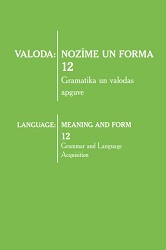Patskaņa Ẹ lietojums nomenu, verbu un adverbu gala zilbēs: dziļo tāmnieku izlokšņu piemērs
The use of the vowel Ẹ in the endings of nominals, verbs and adverbs: A case from the deep Tamian (Tāmnieki) subdialects
Author(s): Daira VēvereSubject(s): Semiotics / Semiology, Phonetics / Phonology, Sociolinguistics, Baltic Languages
Published by: Latvijas Universitātes Akadēmiskais apgāds
Keywords: vowel ẹ; nominals; verbs; adverbs; word ending; the deep Tamian (Tāmnieki) subdialects; the Livonic dialect;
Summary/Abstract: The present research aims at describing the use of the vowel ȩ and its phonetic variants e, e and a in the endings of nominals (including nouns, adjectives, and numerals), verbs and adverbs. The linguistic analysis is based on speech data from older speakers, acquired by interviewing the speakers of seven deep Tamian (Tāmnieki) (or Courland Livonic) subdialects of the Livonic dialect: Pope, Ziras, Piltene, Zlēkas, Ance, Dundaga and Ugāle during the period of 2008–2019. These data are compared with materials from the University of Latvia Latvian Language Institute dialect archive (obtained in the 1950s and 1960s). The results of the present research show that use of the vowel ȩ still occurs in the singular and plural locative case, less often in the singular and plural dative case. The adverbs of place, e.g., iêkšȩ // iêkše // iêkše (< iekšā) ‘inside’, viêrsȩ // virsȩ // viêrsȩ // virsȩ // viêrse // virse (< virsū) ‘above’, etc., are still used in all deep Tamian subdialects. The vowels ȩ and e also appear in the endings of the definite adjectives and numerals, e.g., vȩcȩs (< vȩcais) ‘the old one’, mazȩs (< mazais) ‘the little one’, pirmȩs // pirmes (< pirmais) ‘the first’, etc. Shortened verb forms with the endings -ȩ or -e nowadays are mostly used in the subdialects of Ance and Dundaga, although they were also recorded in the subdialects of Piltene (in 2008) and Zlēkas (in 2010). Reflexive verbs and nouns are found mainly in Ance and Dundaga. Even though use of the vowel ȩ and its phonetic variants in the endings of nominals, verbs and adverbs has diminished, it can be concluded that it is still a typical linguistic feature of the deep Tamian subdialects.
Journal: Valoda: nozīme un forma
- Issue Year: 2021
- Issue No: 12
- Page Range: 227-239
- Page Count: 13
- Language: Latvian

